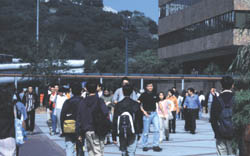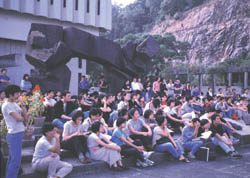 Online
Edition
Online
Edition | From
the editor Letters to the editor Milestone Answerman Periscope Campus Life Social Issues People Photo Features Education Channel Culture & Leisure Science |
| Last
Issue Archive |
| About
Varsity Advertise Media Links CUHK homepage JLM homepage |
Related
Links
Student Financial
Assistance Agency
Hong Kong Professional Teachers' Union
![]()
Non-Means
Test Loan Scheme
Students put off by high interest
By Tramy Heung
Tung Chee Hwa is going to extend the scope of the Non-Means Test Loan Scheme. Educationalists and students are doubtful about its effectiveness in helping students.
Its extension comes after his proposal in the Year 2000 Policy Address.
It states that within 10 years, 60 percent of senior secondary school leavers will receive tertiary education. This equals a total number of around 55,000 places.
Mr. Lee Ho Tak is a student representative of the Joint Committee on Student Finance, a group advising the management of the Non-Means Test Loan Scheme.
He said that students are actually worse off under the extension of the scheme.
The most controversial subject is the market interest rate borne by students.
He said that the scheme is running on a "no-gain-no-loss basis".
Said Mr. Lee: "Many students complain that the interest rate is prohibitive. If I borrow $10,000 from the scheme, I will have to pay $5,000 in interest, which is equal to half of the principal.
"Although the application procedure is easy, students do not apply for the scheme unless they are extremely in need. So applications for the scheme are not many."
Mr. Chan King Wai is the assistant controller of the Student Financial Assistance Agency.
According to Mr. Chan, about 25 percent and 20 percent of University Grant Committee-funded tertiary students applied for the loan in 1998 and 1999, respectively.
About 55 percent and 53 percent of all applications were accepted in the academic years 1998-1999 and 1999-2000.
The Non-Means Test Loan Scheme was introduced in 1998 to complement the Local Student Finance Scheme.
It aims at offering a means for those who cannot afford tuition fees but want to carry on in their education.
With effect from 1 October 2000, the interest rate of Non-Means Test Loan changed from 8.25 percent to 9 percent per annum.
Joe So, a Year 1 student at City University of Hong Kong, said he did not apply for the loan and opposed its extension.
Said he: "The interest is so high that it is like borrowing money from commercial banks.
"If this is the case, I would prefer not to borrow from anywhere."
Orange Chan, a Year 1 student at The Chinese University of Hong Kong, also did not apply for the scheme.
Said she: "If I apply for it, I will have to suffer for 10 years. My family and I prefer working harder now and having less stress after my graduation."
To meet the financial needs of a larger number of students, Mr. Chan of the financial assistance agency explained that the government has to extend the scheme.
Mr. Chan said there is a growing demand for financial assistance from students studying in self-financed programmes offered by public-funded institutions.
Educationalists welcome the idea of providing assistance to more students in need.
Mr. Ng Shun Wing is the deputy director of the Education Research Department of the Hong Kong Professional Teachers' Union.
He suggested the introduction of a low interest rate loan scheme to lessen students' burdens.
The boost of tertiary admission rates to 60 percent will probably include students studying at private universities and colleges as well as those studying for associate degrees.
Mr. Ng said, "Some courses are often self-financed. But government subsidies for these courses and students are not enough."
Mr. Ng said the government has paid more attention to University Grant Committee-funded institutions, putting lots of resources to assist students there.
But for non-University Grant Committee-funded organisations, the government emphasises self-financing.
So assistance in terms of grants for students is little. Students can then only rely on loans.
He said that this creates an unfair situation. Students with good results can go to University Grant Committee-funded universities, whereas those with poor results can only go to colleges or study in self-funding programs, thus receiving less grants.
Even with the provision of loans, Mr. Ng also thinks that the interest rates are too high.
He said, "I think tertiary education is a national investment. The government has the responsibility to bear the costs."
Both Mr. Lee and Mr. Ng suggest lowering the interest rates of the loans.
Apart from lowering the interest rates, Miss Chan suggested that the scheme can be improved by making the deferred repayment scheme more flexible.
However, Mr. Chan of the agency said that whether the interest rate is high or not depends on how students measure it.
"The scheme runs on its own mechanism. If not, the fund keeps diminishing, there will be no funds left for future applicants.
"Of course, we also want to lower the interest rates to help students in need. But we have to follow the market rates."
Apart from its extension, the scheme may undergo another great change.
The government is now studying the possibility of farming out the administration work for the scheme.
Mr. Chan said, "Our studies show that there are advantages of contracting out the administrative work to banks or private companies.
"Say, students can go to any branch of a bank to process their applications. It would be more convenient for students.
"Also, the interest rates follow the market mechanism and are less rigid. We would be assured that the interest rates would not be too high," he said.
But Mr. Chan stressed that this plan will not be implemented without a full understanding and agreement of the government, banks and students.
While the government is optimistic about the idea, students are doubtful.
Said Mr. Lee: "We are doubtful about the degree of security and the discounts offered by banks.
"If the work is contracted out, what if different banks work together to raise interest rate?
"Also, if a student has a poor credit record, banks could reject that person's application for loan. It would be a very insecure situation for students."
Mr. Ng said,
"A monitoring system is needed if the work is contracted out." ![]()
Non-Means
Tested Loan Scheme
The Non-Means
Tested Loan Scheme aims at providing financial aid in the form of loan
to all students who are eligible for assistance in paying tuition fees.
Full-time
tertiary students in University Grant Committee-funded institutions and
students who are not covered by the Local Student Finance Scheme can apply.
The maximum
loan is capped at tuition fees payable. If one has received any financial
aid under the Local Student Finance Scheme, the maximum amount of Non-Means
Tested Loan would be the difference between the maximum financial aid
and the amount of financial aid received under the Local Student Finance
Scheme, subject to the Non-Means Tested Loan maximum.
The loan
is operated on a full cost recovery basis. Starting from 1 October 2000,
the interest rate is 9 percent per annum.
It is repayable
in 40 quarterly instalments within 10 years after graduation or termination
of study. Loan recipients may make early repayment of the loans. ![]()

Applying for loan is the main way for many university students to pay tuition fees and living expenses.

Students complain about the 9 percent interest rate under the scheme.